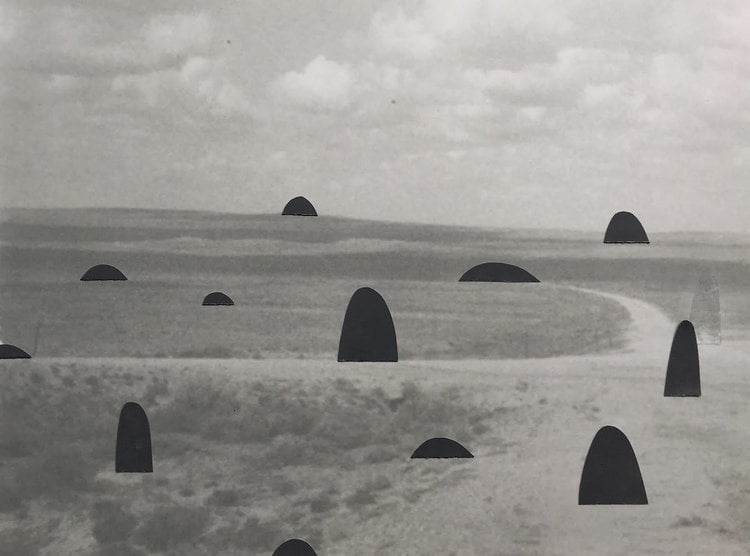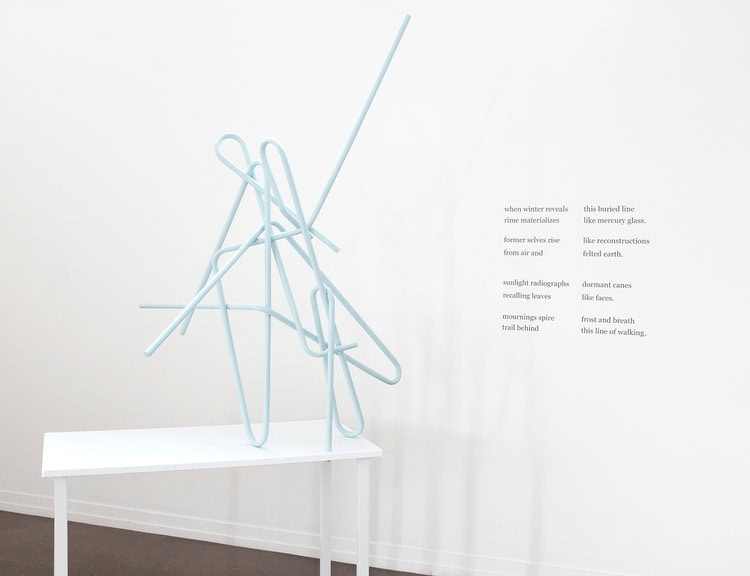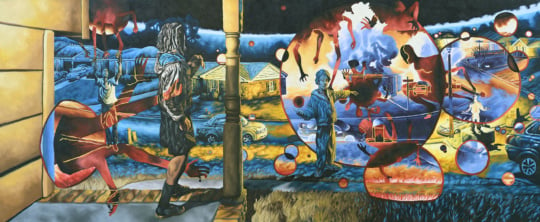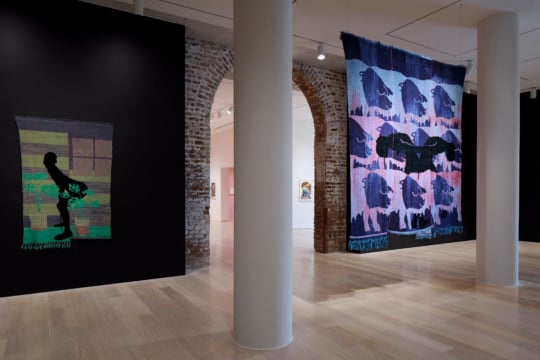
The conceptual, multifaceted work of Nashville-based artist and educator Patrick DeGuira often investigates the nature of systems, specifically how their individual parts interrelate and synthesize into a complex whole. In Land Derived Sentiments: Poems and Responses, the latest group exhibition he’s curated at Zeitgeist Gallery in Nashville, DeGuira continues this investigation with a rigorous focus on the natural world. Based on his book of ecopoetry of the same name, the exhibition brings together photographs, paintings, sculptures, multi-media works, and installations by eleven artists from across the country, including Caroline Allison, Lenka Clayton, Kristi Hargrove, Jana Harper, Adam Henry, R.D. King, Philip Andrew Lewis, John Opera, Greg Pond, Chris Scarborough, and DeGuira himself. Each artist was assigned a poem from the book and made a new work in response, creating a visual and conceptual dialogue between DeGuira’s sentiments and theirs. The result is a meditative and densely layered exhibition that examines the interrelationships and tensions between nature and culture and that underscores the potential for ecologically-minded art-making practices to (re)connect people to the land.
Every work in the exhibition is worthy of close study, but as DeGuira stated at a poetry reading at The Bookshop in Nashville, it should be read as a whole: the cohesive way he’s interfaced multiple mediums, themes, points of view, and poetry in the gallery space makes it clear that he means “read” in many senses of the term. The show necessitates a lot of actual reading–the poems are displayed with each piece it inspired–along with reading the works, both individually and as a curatorial gestalt. This makes for a meditative exhibition that necessitates some stamina, perhaps multiple visits. It unfolds gradually, exposing more layers the longer you stay, and ultimately reveals a way of seeing and thinking about nature that is ecocentric.

The interconnectivity and tension within the human-nature relationship is central to a trio of works installed near the gallery’s entrance. Thirty-six gray rocks, lined up from largest to smallest on a long, shin-high platform, make up the alluring earth art installation Rock Fade (Moon Rock), by artists Lenka Clayton and Philip Andrew Lewis in response to How Mountains are Born, a powerful, single line poem displayed above. It reads: When a world hangs upside down mountains are born. Form is the primary subject here, its trajectory from generation to disintegration concisely illustrated by the progressive “fading” of the rocks—the first one is about the size of a fist and the last one is as barely perceptible as a grain of dust. Nashville-based R.D. King’s Untitled, a large black-and-white close-up image of a cryptic hole, hangs just inches away. Next to Fade (Moon Rock), it appears as both an origin and destination into which the rocks stream toward and move away from simultaneously. This quality is further reinforced by Chris Scarborough’s digital silver print, The Frozen Man, the third work in the grouping and a response to the poem, Collector of Sounds, a dark lament that alludes to environmental destruction and death. Sinister and unnerving, Scarborough’s image is of what looks like a deformed and petrified cadaver, shrouded in shadow, his gaze pointing toward the nearby image of the hole in the ground.
The complex relationship between nature and the act of making connects DeGuira’s installation Line of Walking and his fellow Nashville-based artist, Kristi Hargrove’s Ecotones. An ecotone is a borderland between two ecosystems. When naturally occurring, they are typically species-rich, but they can also be caused by habitat fragmentation from deforestation and other human interventions, which usually results in ecological deterioration and species loss. Straddling abstraction and representation, Hargrove’s grid-like, collage work appears at first as a segmented, desaturated satellite map. Closer study reveals an image of an intricate brush pile made from cut paper and a jagged tree trunk. These images are interspersed with empty areas of black velvet,reflecting carved-up landscapes and the resulting desolation. Line of Walking, based on a poem of the same name about the speaker’s relationship with a particular walking trail, is a large nest-like structure made from ashwood walking canes that sits at eye level on a narrow white table. The poem suggests that the canes were discovered along the trail, and whether or not this is true, DeGuira has transformed them into a mint green tangle of lines, toying with ideas of linearity, utility, and wildness, and hinting at the blurred boundaries between natural and human-made histories held within the land.

Suspended in the middle of the gallery is a towering, three-paragraph statement written by DeGuira that articulates the urgent ethical message behind Land Derived Sentiments: Poems and Responses. Echoing the philosophies articulated by Henry David Thoreau, Aldo Leopold, and more recently, the Sewanee, Tennessee-based writer and biologist, David Haskell, DeGuira writes:
“The myth of human nature, which so often originates in the head, must be reimagined through wide open eyes… We cannot, anymore, become physically or psychologically removed from the ground that grounds our bodies, after all, the health and nourishment of the planet is what distinguishes our capacity to be human. And as intelligent beings continue to emerge–as we better understand that many forms think, learn, store memories–we must recognize that nature is other than “non” or subhuman”…it is our duty to cherish and thrive with this generous place (one we so desperately need) by supporting alternative practices for nature-human living.”
It’s helpful to think about the etymology of the word curate when viewing this show: it derives from the Latin word curare, meaning to “take care of”. Our ecological crisis is in essence a crisis of caring. Its solution? For starters: engagement, attention, noticing. An exhibition may not immediately sway policy, but it can facilitate aesthetic and intellectual experiences that help viewers recover a forgotten sense of unity with nature and, perhaps, recompose our ways of living on this planet.
Land Derived Sentiments: Poems and Responses is on view at Zeitgeist in Nashville through April 27.




